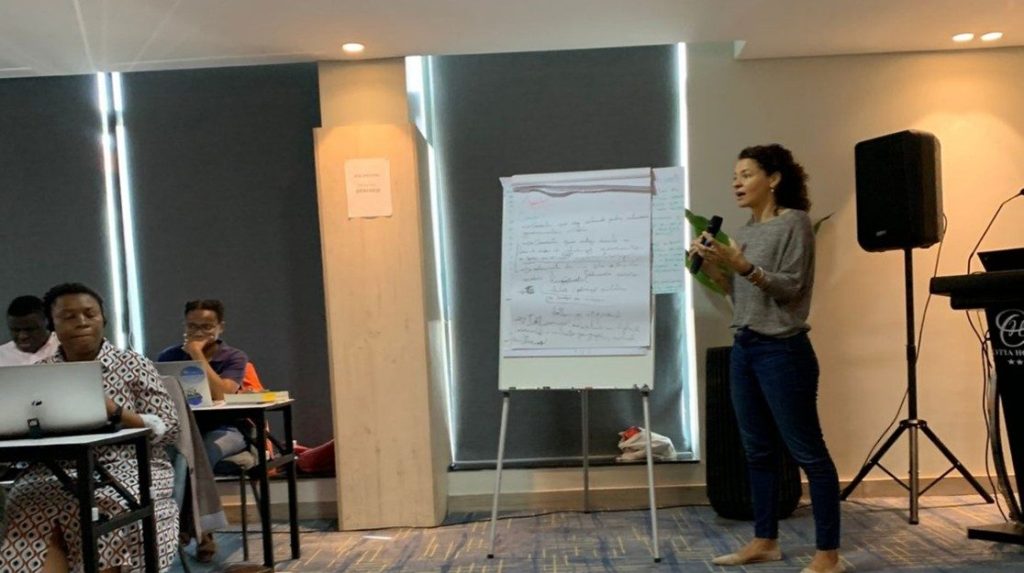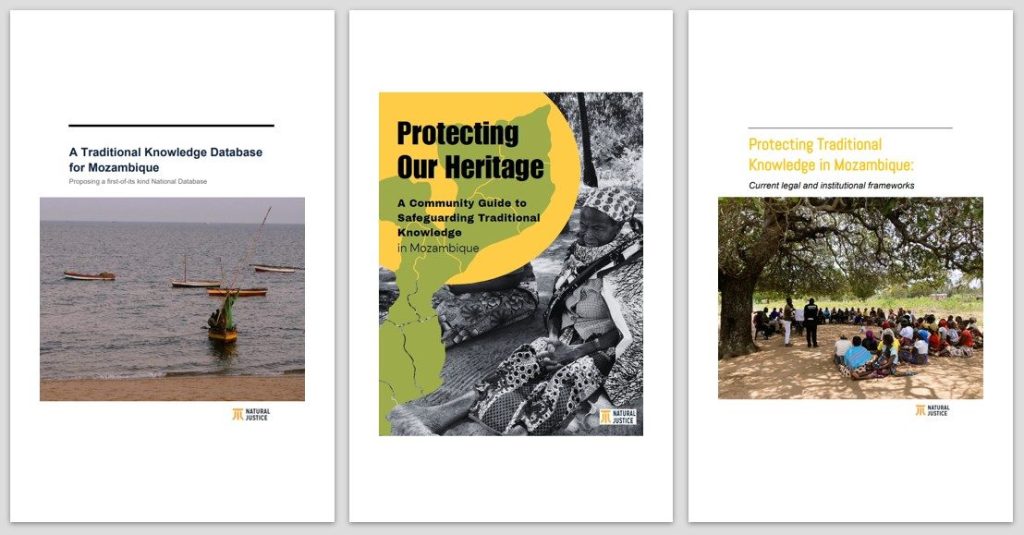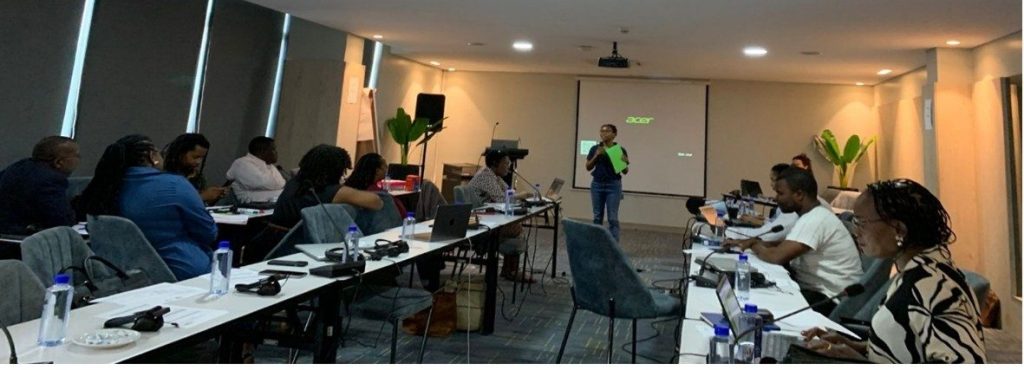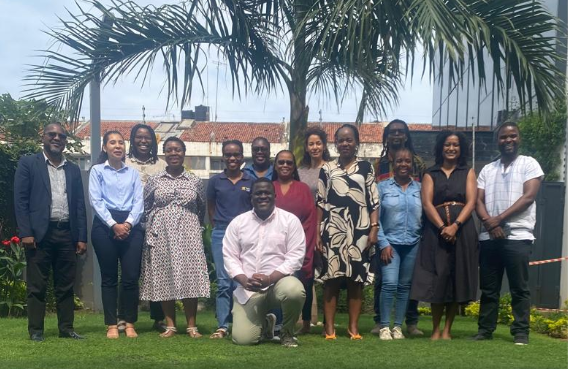Mozambique is home to a wealth of indigenous practices, biological resources, and cultural heritage. These, form an integral part of local livelihoods and identity. The Government of Mozambique approved its Regulation on Access and Fair and Equitable Sharing of Benefits (ABS) Resulting from the Use of Genetic Resources in 2009. The regulation is now under review, but the process will take considerable time – leaving communities holding valuable traditional knowledge vulnerable, without legal protection or tools to deal with risks of biopiracy, misappropriation, cultural erosion, and the loss of their traditional practices.
To respond to this gap, Natural Justice commissioned a research study to be done by Ana Alecia Lyman, aimed at developing a community centred guideline and database. The purpose of the guideline and database is to empower local communities to preserve their own traditional knowledge and traditional cultural expressions for their own benefit, pending the finalisation of the government’s legislative review process. Additionally, through the study Natural Justice seeks to support the government of Mozambique with a policy brief detailing the gaps and challenges of the current legal framework to inform the ABS law reform and share recommendations on equitable benefit sharing. Lyman was guest speaker at a workshop hosted by Natural Justice in Maputo on 9 October 2025, in which Natural Justice shared Ana’s research report and tools.

Consultant, Ana Alecia Lyman presenting the findings of the research on traditional knowledge.
Lyman’s research can be explored in these three publications:
- Protecting Traditional Knowledge: https://naturaljustice.org/publication/protecting-traditional-knowledge-in-mozambique/
- Protecting our Heritage:https://naturaljustice.org/publication/protecting-our-heritage-a-community-guide-to-safeguarding-traditional-knowledge-in-mozambique/
- Database:https://naturaljustice.org/publication/a-traditional-knowledge-databasefor-mozambique/

Safeguarding Mozambique’s cultural heritage and biodiversity
The one-day workshop brought together a diverse array of stakeholders, including government officials, indigenous and local community leaders, researchers, civil society organizations, and private sector actors. The aim was to foster dialogue, build capacity, and develop practical strategies to utilise the report and tools and strengthen the safeguarding of Mozambique’s rich cultural heritage and biodiversity through a rights-based, participatory approach pending national legislation coming into effect.
Key discussions and highlights
During the workshop, participants reviewed Mozambique’s complex legal landscape, which includes the Access and Benefit Sharing Regulation, Forest Act, Cultural Heritage Law, and ratified international treaties such as the Convention on Biological Diversity (CBD) and the Nagoya Protocol. Ongoing initiatives, like the prototype National Portal for Access and Benefit-Sharing (ABS), were discussed as promising tools to streamline processes for accessing genetic resources and sharing benefits equitably.

Legal Empowerment Workshop participants on 9 October 2025, in Maputo, Mozambique
Opportunities and case studies
Participants highlighted that historically, Mozambique has faced biases against traditional knowledge, compounded by institutional fragmentation and limited research funding allocated towards traditional knowledge studies. Secondly, the absence of dedicated research centres and institutions responsible for the protection of traditional knowledge, has further impeded progress towards recognition. As a result, valuable data and cultural practices have been lost. Participants emphasised that there was an urgent need for legal recognition for communities as custodians of traditional knowledge in genetic species and a robust mechanism to ensure Free, Prior, and Informed Consent (FPIC).
Natural Justice shared case studies from other countries of successful examples of traditional knowledge use, legal and institutional frameworks from the African continent. The case studies demonstrate how legal recognition and progressive jurisprudence can reinforce community rights and promote sustainable development.
READ: https://naturaljustice.org/publication/the-khoikhoi-peoples-rooibos-biocultural-community-protocol/
What happens next?
Participants agreed that advancing traditional knowledge protection requires a multi-faceted approach, including:
- Strengthening legal recognition of indigenous and local communities as custodians of Traditional Knowledge.
- Developing community-led documentation strategies that respect cultural sensitivities and traditional practices.
- Establishing accessible Traditional Knowledge databases that facilitate research, innovation, and benefit-sharing.
- Promoting capacity-building among communities and government agencies to effectively negotiate benefit-sharing agreements and enforce legal protections.
- Leveraging regional and international cooperation to harmonize policies and share best practices.
Ongoing dialogue, research, and policy development
Natural Justice’s commitment to protecting traditional knowledge assets in Mozambique through legal empowerment marks an important step towards recognising indigenous rights and fostering sustainable biodiversity conservation. The insights gained from this workshop lay a foundation for ongoing dialogue, research, and policy development, aimed at creating an inclusive, rights-based framework that honours indigenous and local communities’ cultural heritage.
Moving forward, concerted efforts are essential to ensure that traditional knowledge is preserved, respected, and used as a driver for sustainable development in Mozambique.
Wandile Brian Zondo is a Researcher at Natural Justice, Southern Africa Hub, and a PhD Candidate in Public Law at the University of Cape Town (UCT). He is an Oppenheimer Memorial Trust (OMT) Scholarship recipient and holds an LLM in Environmental Law (UCT) and an LLB (University of KwaZulu-Natal (UKZN)).

